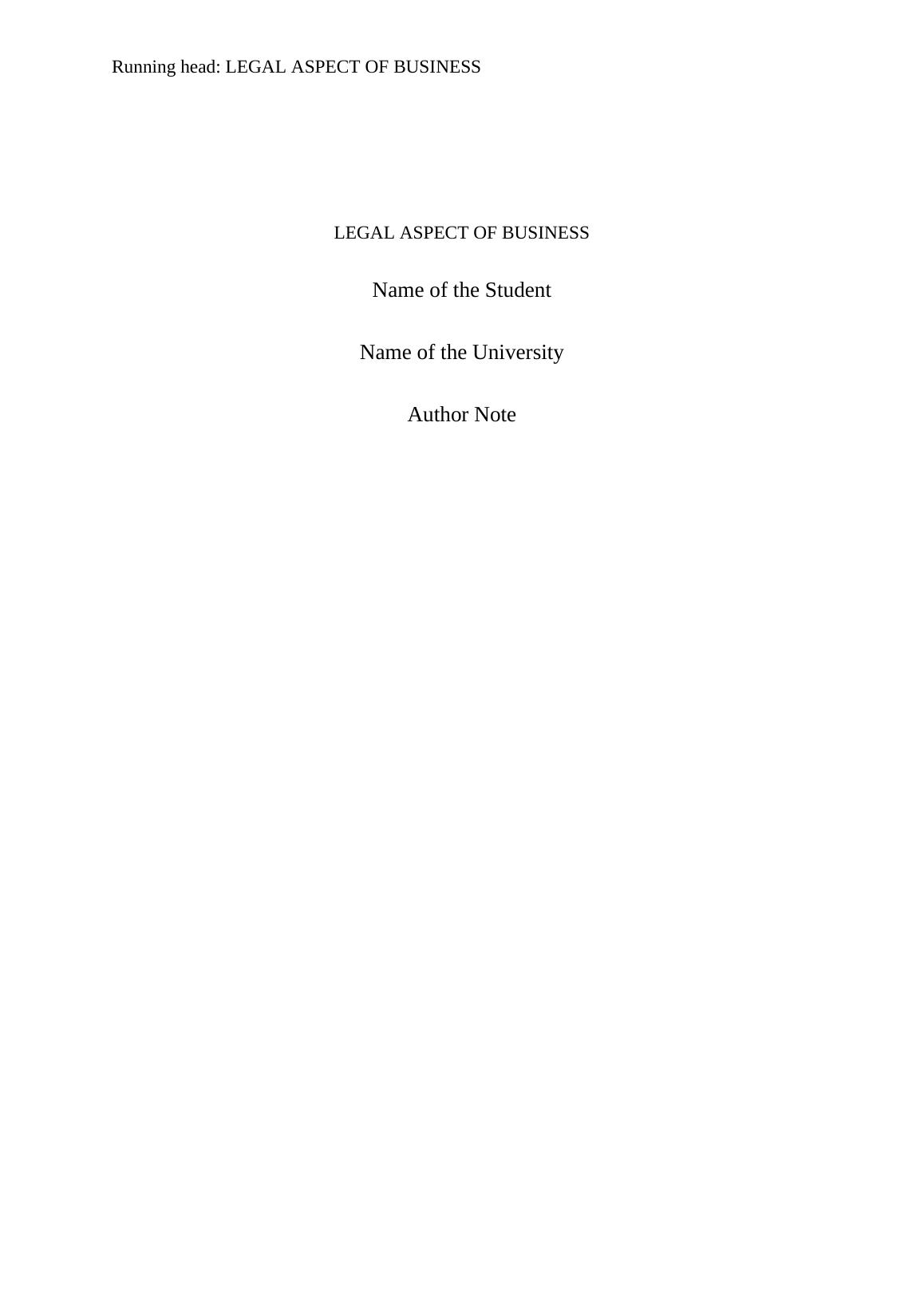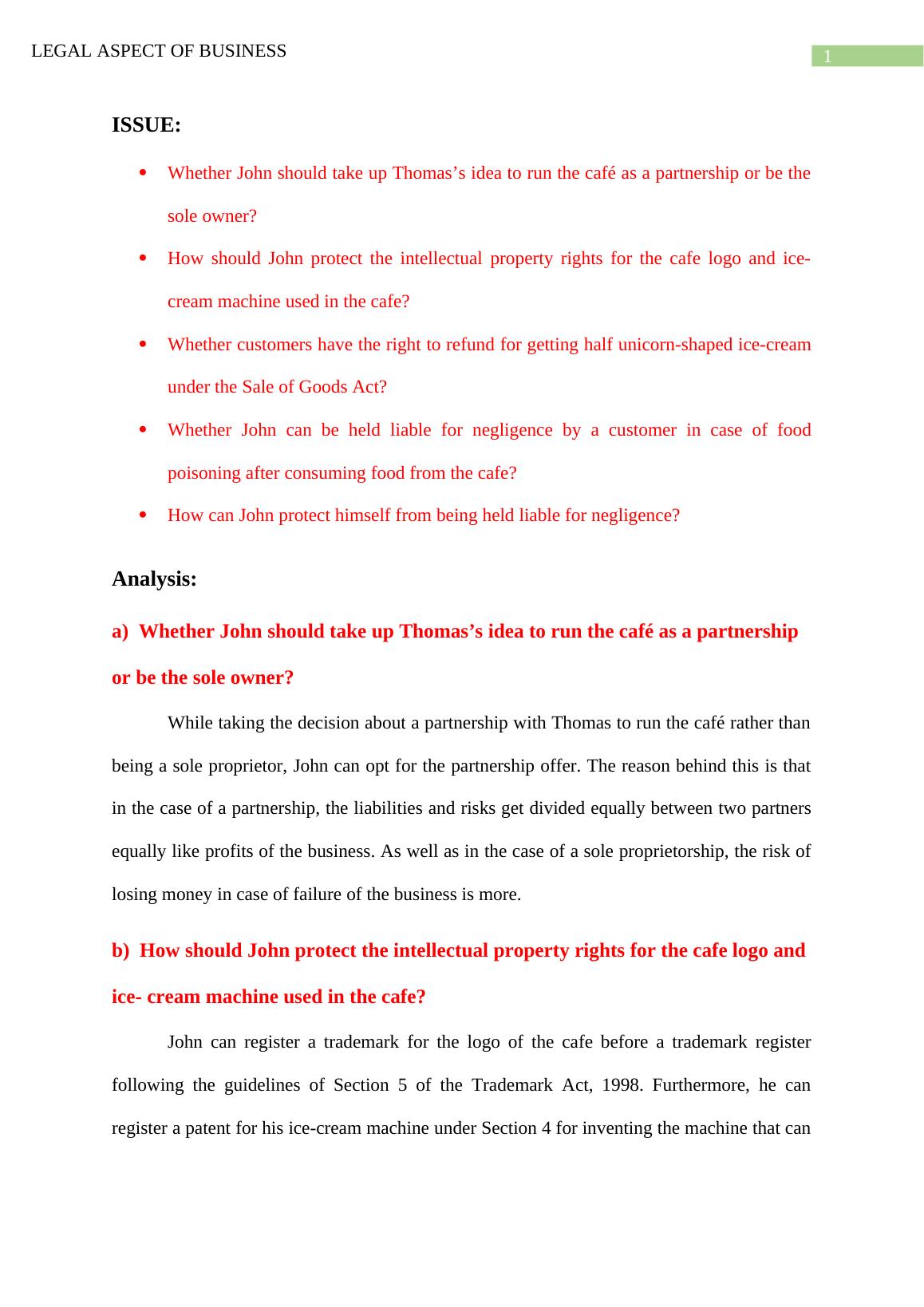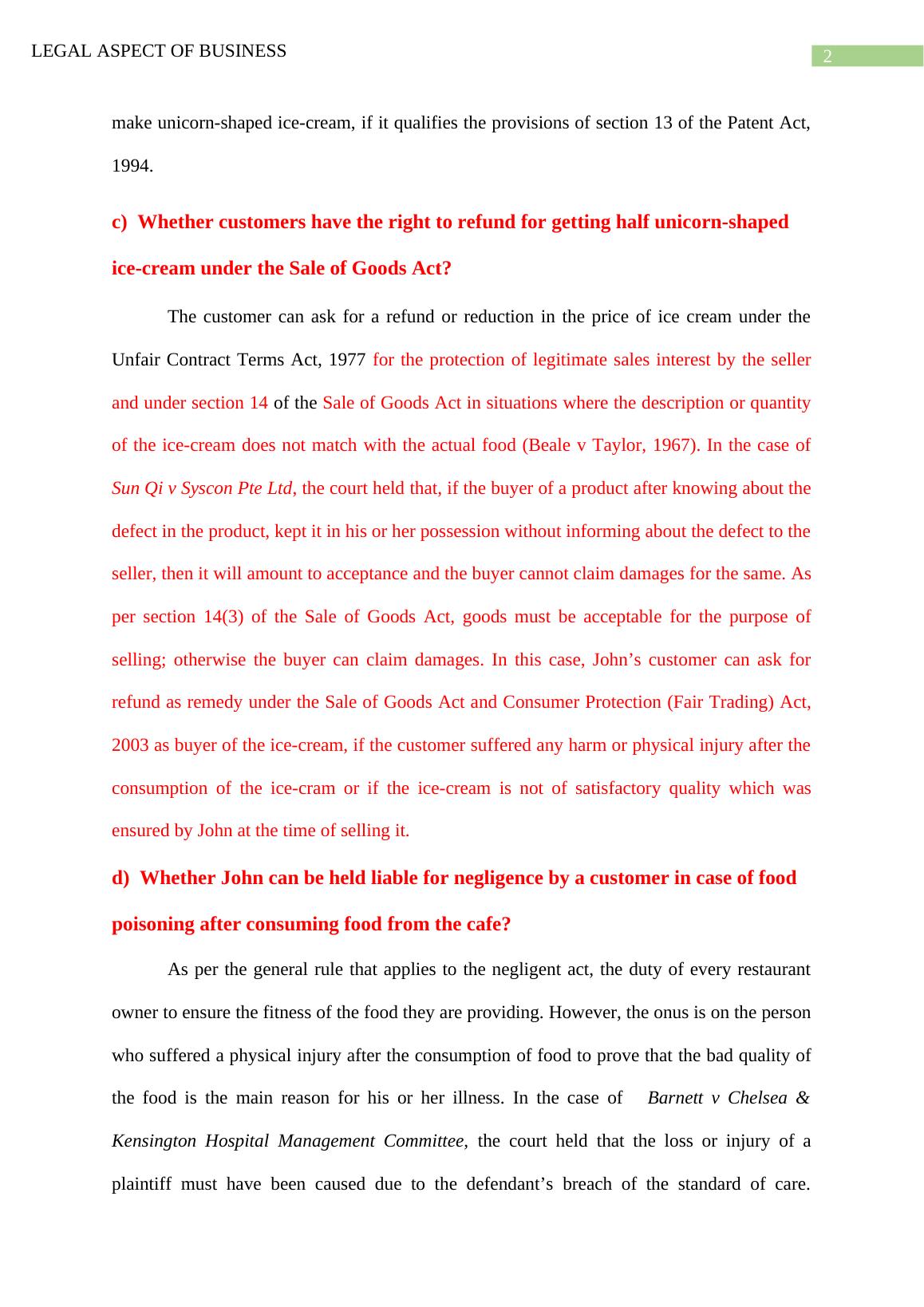Legal Aspect of Business | Case Study Analysis
Added on 2022-08-14
6 Pages1471 Words15 Views
Running head: LEGAL ASPECT OF BUSINESS
LEGAL ASPECT OF BUSINESS
Name of the Student
Name of the University
Author Note
LEGAL ASPECT OF BUSINESS
Name of the Student
Name of the University
Author Note

LEGAL ASPECT OF BUSINESS
1
ISSUE:
Whether John should take up Thomas’s idea to run the café as a partnership or be the
sole owner?
How should John protect the intellectual property rights for the cafe logo and ice-
cream machine used in the cafe?
Whether customers have the right to refund for getting half unicorn-shaped ice-cream
under the Sale of Goods Act?
Whether John can be held liable for negligence by a customer in case of food
poisoning after consuming food from the cafe?
How can John protect himself from being held liable for negligence?
Analysis:
a) Whether John should take up Thomas’s idea to run the café as a partnership
or be the sole owner?
While taking the decision about a partnership with Thomas to run the café rather than
being a sole proprietor, John can opt for the partnership offer. The reason behind this is that
in the case of a partnership, the liabilities and risks get divided equally between two partners
equally like profits of the business. As well as in the case of a sole proprietorship, the risk of
losing money in case of failure of the business is more.
b) How should John protect the intellectual property rights for the cafe logo and
ice- cream machine used in the cafe?
John can register a trademark for the logo of the cafe before a trademark register
following the guidelines of Section 5 of the Trademark Act, 1998. Furthermore, he can
register a patent for his ice-cream machine under Section 4 for inventing the machine that can
1
ISSUE:
Whether John should take up Thomas’s idea to run the café as a partnership or be the
sole owner?
How should John protect the intellectual property rights for the cafe logo and ice-
cream machine used in the cafe?
Whether customers have the right to refund for getting half unicorn-shaped ice-cream
under the Sale of Goods Act?
Whether John can be held liable for negligence by a customer in case of food
poisoning after consuming food from the cafe?
How can John protect himself from being held liable for negligence?
Analysis:
a) Whether John should take up Thomas’s idea to run the café as a partnership
or be the sole owner?
While taking the decision about a partnership with Thomas to run the café rather than
being a sole proprietor, John can opt for the partnership offer. The reason behind this is that
in the case of a partnership, the liabilities and risks get divided equally between two partners
equally like profits of the business. As well as in the case of a sole proprietorship, the risk of
losing money in case of failure of the business is more.
b) How should John protect the intellectual property rights for the cafe logo and
ice- cream machine used in the cafe?
John can register a trademark for the logo of the cafe before a trademark register
following the guidelines of Section 5 of the Trademark Act, 1998. Furthermore, he can
register a patent for his ice-cream machine under Section 4 for inventing the machine that can

LEGAL ASPECT OF BUSINESS
2
make unicorn-shaped ice-cream, if it qualifies the provisions of section 13 of the Patent Act,
1994.
c) Whether customers have the right to refund for getting half unicorn-shaped
ice-cream under the Sale of Goods Act?
The customer can ask for a refund or reduction in the price of ice cream under the
Unfair Contract Terms Act, 1977 for the protection of legitimate sales interest by the seller
and under section 14 of the Sale of Goods Act in situations where the description or quantity
of the ice-cream does not match with the actual food (Beale v Taylor, 1967). In the case of
Sun Qi v Syscon Pte Ltd, the court held that, if the buyer of a product after knowing about the
defect in the product, kept it in his or her possession without informing about the defect to the
seller, then it will amount to acceptance and the buyer cannot claim damages for the same. As
per section 14(3) of the Sale of Goods Act, goods must be acceptable for the purpose of
selling; otherwise the buyer can claim damages. In this case, John’s customer can ask for
refund as remedy under the Sale of Goods Act and Consumer Protection (Fair Trading) Act,
2003 as buyer of the ice-cream, if the customer suffered any harm or physical injury after the
consumption of the ice-cram or if the ice-cream is not of satisfactory quality which was
ensured by John at the time of selling it.
d) Whether John can be held liable for negligence by a customer in case of food
poisoning after consuming food from the cafe?
As per the general rule that applies to the negligent act, the duty of every restaurant
owner to ensure the fitness of the food they are providing. However, the onus is on the person
who suffered a physical injury after the consumption of food to prove that the bad quality of
the food is the main reason for his or her illness. In the case of Barnett v Chelsea &
Kensington Hospital Management Committee, the court held that the loss or injury of a
plaintiff must have been caused due to the defendant’s breach of the standard of care.
2
make unicorn-shaped ice-cream, if it qualifies the provisions of section 13 of the Patent Act,
1994.
c) Whether customers have the right to refund for getting half unicorn-shaped
ice-cream under the Sale of Goods Act?
The customer can ask for a refund or reduction in the price of ice cream under the
Unfair Contract Terms Act, 1977 for the protection of legitimate sales interest by the seller
and under section 14 of the Sale of Goods Act in situations where the description or quantity
of the ice-cream does not match with the actual food (Beale v Taylor, 1967). In the case of
Sun Qi v Syscon Pte Ltd, the court held that, if the buyer of a product after knowing about the
defect in the product, kept it in his or her possession without informing about the defect to the
seller, then it will amount to acceptance and the buyer cannot claim damages for the same. As
per section 14(3) of the Sale of Goods Act, goods must be acceptable for the purpose of
selling; otherwise the buyer can claim damages. In this case, John’s customer can ask for
refund as remedy under the Sale of Goods Act and Consumer Protection (Fair Trading) Act,
2003 as buyer of the ice-cream, if the customer suffered any harm or physical injury after the
consumption of the ice-cram or if the ice-cream is not of satisfactory quality which was
ensured by John at the time of selling it.
d) Whether John can be held liable for negligence by a customer in case of food
poisoning after consuming food from the cafe?
As per the general rule that applies to the negligent act, the duty of every restaurant
owner to ensure the fitness of the food they are providing. However, the onus is on the person
who suffered a physical injury after the consumption of food to prove that the bad quality of
the food is the main reason for his or her illness. In the case of Barnett v Chelsea &
Kensington Hospital Management Committee, the court held that the loss or injury of a
plaintiff must have been caused due to the defendant’s breach of the standard of care.

End of preview
Want to access all the pages? Upload your documents or become a member.
Related Documents
Fundamentals of Intellectual Property Law in Singaporelg...
|7
|1626
|33
Report on Intellectual Property Lawlg...
|9
|2897
|159
Sales of Goods Act and Consumer Protectionlg...
|7
|1876
|71
Intellectual Property Law Assignment (Solved)lg...
|10
|2826
|96
Implementation of Intellectual Property Rightslg...
|7
|1457
|486
Business Law INTRODUCTIONlg...
|11
|3237
|77
